Support Us
Since 1979 more than 140,000 animals have been treated by Wildlife Rescue.
Thanks to the support of individuals like you, Wildlife Rescue can provide a lifeline for animals in distress.
Feeding. Cleaning. Health checks. Feeding. Cleaning. Health checks.
A day in the life of a Wildlife Care Assistant may sound repetitive, but each day brings new challenges that will keep you on your toes, and new inspiration that connects you to nature and animals.
Your main responsibility is to the baby birds – you are there to care for them throughout their development and rehabilitation. The tiniest of babies need to be fed every 15-minutes. So, when you have a room full of babies, it can be an endless circuit of feeding. Yet, somewhere in-between the feeds you need to clean them and their enclosures, and assess their development.
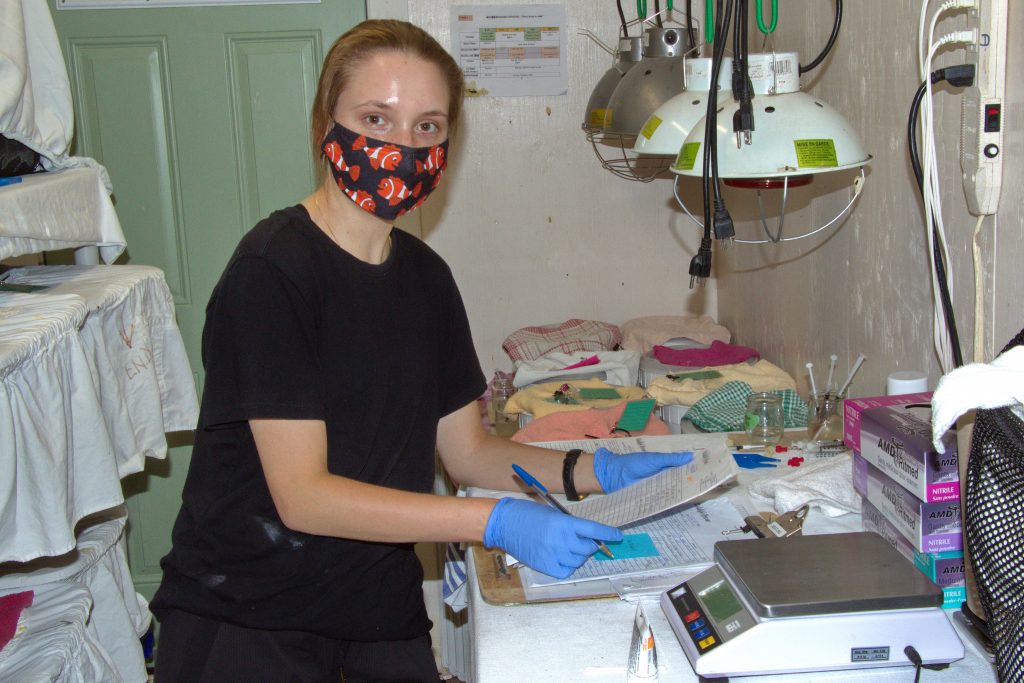
Lauren, a CSJ, doing daily health checks.
At first, it can feel overwhelming, but the support system at Wildlife Rescue is unparalleled. We are all there for the same reason – to give wildlife a second chance at a natural life.
Your fellow co-workers are your lifeline, we are a true team of people who always have each other’s backs. Everyone at Wildlife Rescue is extremely compassionate and knowledgeable. They care deeply about helping wildlife, and are extremely dedicated to teaching and mentoring fellow staff and volunteers.
You will get dirty, you will get poop in your hair, and you will make mistakes. You will also have the privilege to help wildlife up close and personal, animals that need you and depend on you for their survival. You will have a million questions, and you’ll learn from each of them. Making you confident and skilled in caring for these little creatures.
Working at Wildlife Rescue has not only helped to build upon my animal rehabilitation skills, and natural history knowledge, but it has built my confidence and leadership skills significantly. I highly recommend this program to anyone who is itching to work in a high-paced and high-stakes environment. It can be mentally and physically challenging, but it is also incredibly rewarding.
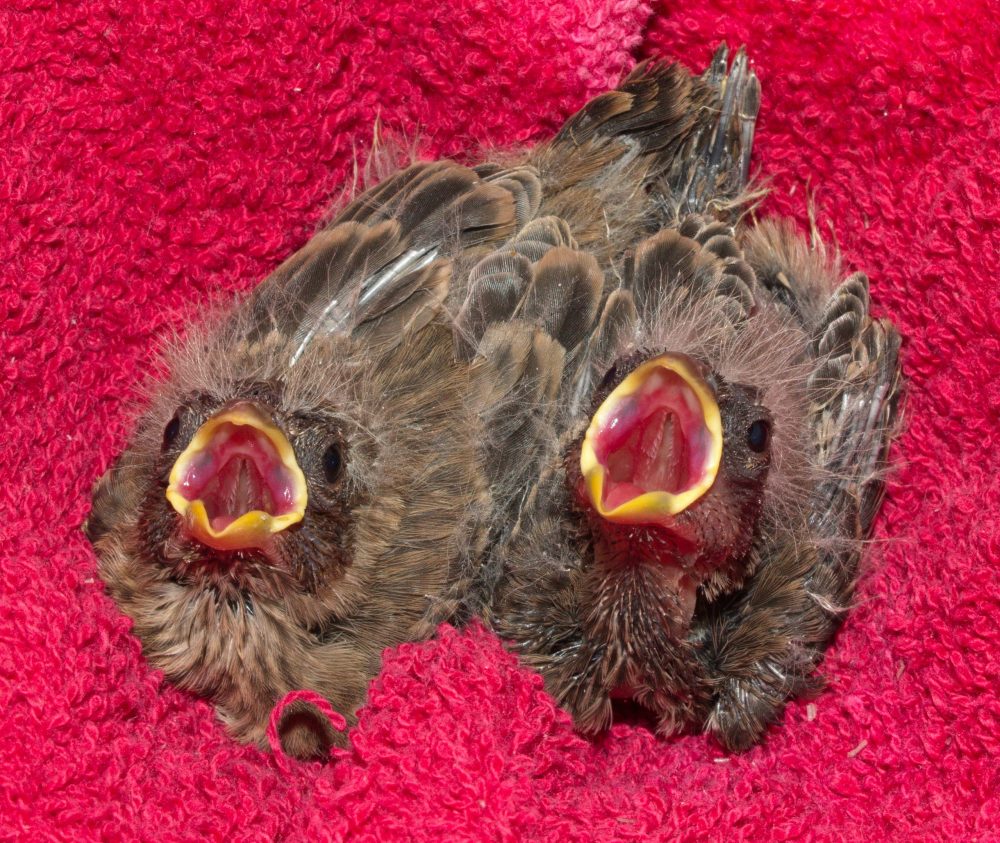
Nestling House Finches waiting to be fed!
I am a graduate of the University of British Columbia’s Applied Biology program where I studied animal biology, welfare, and conservation. I first fell in love with wildlife rehabilitation when completing a practicum at the Marine Mammal Rescue Centre. I also completed courses from the International Wildlife Rehabilitation Council. All of these experiences helped to make me a suitable candidate for this position. However, what Wildlife Rescue is looking for is someone who perseveres and is passionate about helping wildlife, and has the ability to think critically. Wildlife rehabilitation is all about problem-solving, and sometimes you have to be creative to come up with solutions.
In the words of my fellow CSJ for the past two years, Paula :
“The CSJ program offers such a unique opportunity to support the recovery and development of birds in BC affected by human activity. From seeing feathers emerge and unfurl as a nestling grows to helping a Brown Creeper learn that he can’t eat upside down, every day is different!
I worked with 30 species at WRA and absolutely loved learning to apply species natural history to patient care and seeing all the different personalities of our patients. This work is conservation at the finest level.
There’s a quote from author Karen Davison I always amend for wildlife rehabilitation: While saving one bird may not change the world, for that one bird the world changes forever. With almost 5000 patients annually, WRA and all CSJs are making a huge impact!”
Paula Gomez Villalba, CSJ Wildlife Care Assistant 2019, 2020
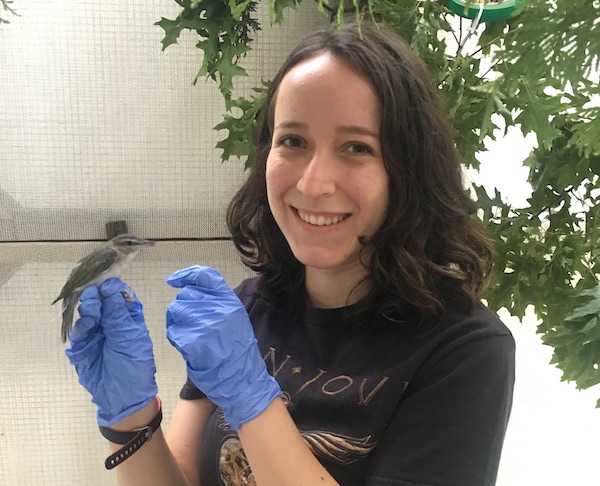
IN SUMMARY: The days will fly by, you will make new friends, and you will learn so much more than you ever thought possible about birds!
Sasha Rink,
CSJ Wildlife Care Assistant 2019, 2020
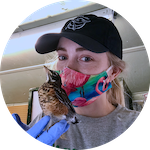
The Canada Summer Jobs program is an initiative funded by the Government of Canada to help young Canadians aged 15-30 gain practical work experience. The experiences gained through funded placements should further develop their skills and knowledge, preparing them to make a transition into employment. For more information, visit the Government of Canada’s website.
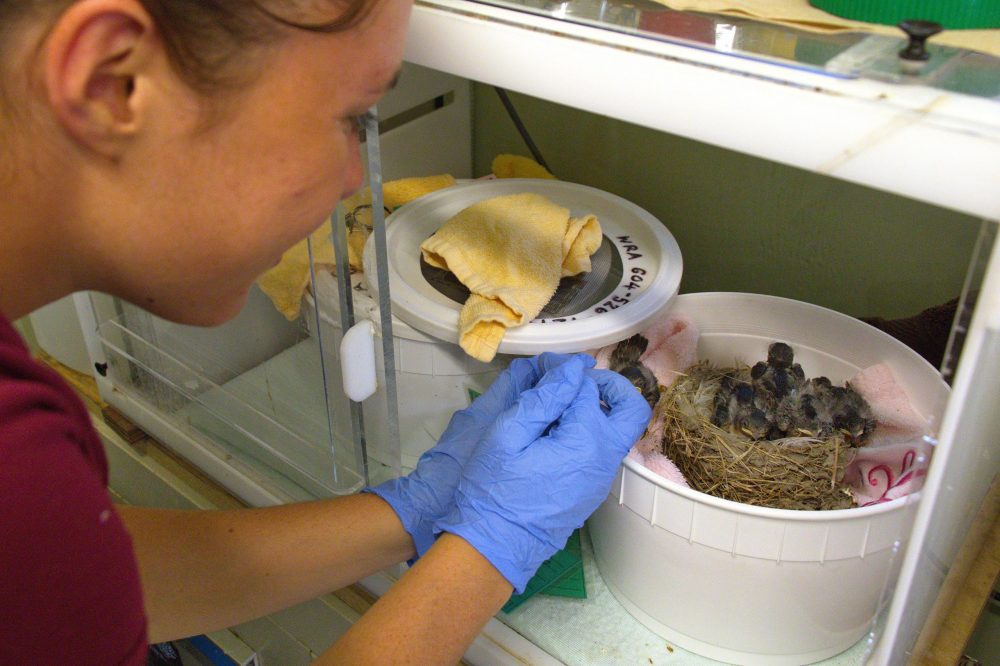
Diana, a CSJ, feeding nestling Barn Swallows in an incubator.
The Wildlife Care Assistants are an integral part of our wildlife rehabilitation program. The majority of our wildlife patients come in during the summer months and no longer have parents to care for them. In the urban environment, where WRA is located, the baby birds become orphaned mostly due to human activity. We at WRA believe we must reduce our impact on the ecosystem and have a responsibility to give these animals a second chance!
The Wildlife Care Assistant’s main responsibility is caring for and raising our baby Altricial birds. Altricial Baby birds cannot care for themselves; these include songbirds (such as robins, swallows, sparrows, hummingbirds…), and corvids (such as ravens, crows…). They need us to feed them, keep them clean, warm them, and teach them how to fly, self-feed and survive in the wild. Becoming a Wildlife Care Assistant is an amazing opportunity to have hands-on experience with wildlife. You will learn new skills that will prepare you for any animal or biology-related career such as: wildlife natural history, anatomy, medical care for wildlife, enrichment, animal care, and animal welfare. You will also learn skills that will help you in any career such as: teamwork, communication, training, working with volunteers, time management, leadership, problem-solving and critical thinking.
I myself became a Wildlife Care Assistant after Volunteering at WRA. It is a life-changing experience having the opportunity to work directly with wildlife and other people who share your values. Still to this day, after 15 years working with wildlife, the baby birds that we have the privilege of raising open my heart and make me forget all but the true and good things that will be done someday.
Janelle Stephenson,
Wildlife Hospital Manager

> Learn more about this position and how to apply here.